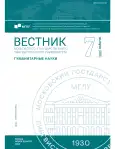О некоторых источниках пополнения современного немецкого молодежного сленга
- Авторы: Ефимова О.С.1
-
Учреждения:
- Московский государственный лингвистический университет
- Выпуск: № 7(888) (2024)
- Страницы: 36-43
- Раздел: Языкознание
- URL: https://journal-vniispk.ru/2542-2197/article/view/299411
- ID: 299411
Цитировать
Аннотация
В статье рассматриваются некоторые источники пополнения немецкого молодежного сленга, анализируются словообразовательные механизмы, используемые немецкой молодежью в процессе словотворчества. Рассматриваются пути пополнения данной лексики в результате особого, нетривиального применения метафорического и метонимического переноса, иронии, антономазии, стилизации. Лексемы данной социальной группы обладают оценочной функцией, часто – комическим эффектом.
Ключевые слова
Об авторах
Ольга Станиславовна Ефимова
Московский государственный лингвистический университет
Автор, ответственный за переписку.
Email: Jefimija3@yandex.ru
кандидат филологических наук, доцент кафедры грамматики и истории немецкого языка факультета немецкого языка
РоссияСписок литературы
- Зоркина К. В. Лингвопрагматические характеристики молодежного сленга (на материале немецкого языка): дис. … канд. филол. наук, Волгоград, 2020.
- Трахтенберг В. Ф. Блатная музыка (жаргон тюрьмы). СПб., 1908.
- Загребин В. В. Подходы к определению категории «молодежь» // Концепт: научно-методический электронный журнал. 2014. № 2. С. 26–30. URL: http://e-concept.ru/2014/14030.htm
- Курышева О. В. Психологическая характеристика молодежи как возрастной группы // Вестник Волгоградского государственного университета. Серия 7: Философия. 2014. № 1. С. 67–75.
- Naer N. M. Stilistik der deutschen Sprache. М.: МПГУ, 2015.
- Девкин В. Д. Занимательная лексикология. М.: Гуманитарный издательский центр Владос, 1998.
- Земчихина Л. С. Ирония: к проблеме определения // Наука и школа. 2018. № 6. С. 155–157.
- Бойкова И. Б., Ковальчук Н. К. Тенденции формирования молодежного сленга в современном немецком языке. URL: www.gramota.net/materials/2/2020/9/35.html.
- Девкин В. Д. Возникновение слов и фразеологизмов на базе частичного звукового подобия // Вопросы лексикологии немецкого и французского языков: сборник трудов МГПИ им. В. И. Ленина. 1980. С. 21–33.
Дополнительные файлы











